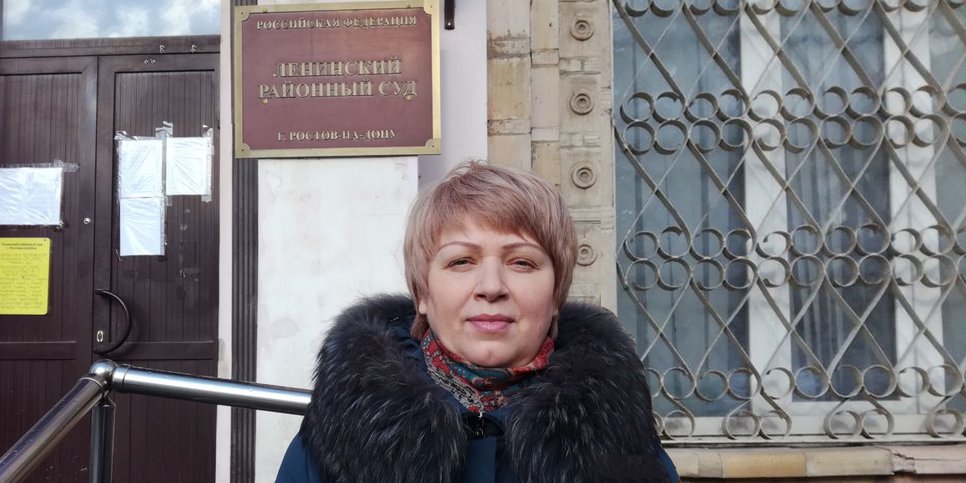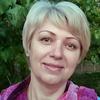In the photo: Galina Parkova, Rostov-on-Don. 25 January 2021
In the photo: Galina Parkova, Rostov-on-Don. 25 January 2021
A sentence for discussing the Bible has been imposed in Rostov-on-Don. Galina Parkova received a two-year-three-month suspended sentence
Rostov RegionOn January 26, 2021, judge of the Leninsky District Court of Rostov-on-Don, Snezhana Fedorova, sentenced Galina Parkova to 2 years and 3 months on probation with the same probation period. The court considered the participation of a believer in peaceful religious meetings of Jehovah's Witnesses as extremism.
“I am allegedly being judged not for my faith, but for extremism, but no signs of this grave crime have been found. During the trial, we examined the teachings of Jehovah's Witnesses, and the indictment now and then flashes phrases: “bowed her head for prayer”, “sang along” ... There is a substitution of concepts. The religious life of an individual is presented as the activity of a prohibited legal entity, ”Galina Parkova said in her last word to the court on the eve of the verdict. She drew attention to the fact that there are no victims in the case, and her convictions are aimed at helping, not harming people. “An extremist without extremism, like borscht without vegetables, does not exist! My conscience is clear before God and before the law, ”said the believer.
The criminal case under Part 2 of Art. 282.2 (participation in the activities of an extremist organization) against Galina Parkova was initiated on June 6, 2019. The investigation was supervised by the First Investigation Department of the Main Investigation Department of the Investigative Committee of the Russian Federation.
Galina and two of her fellow believers (the cases of Olga Ganusha and Lyudmila Ponomarenko are separated into separate proceedings) were accused of participating in meetings at which prayers were sounded and Bible discussions were held, which the security officials considered a threat to the security of society and the state. The logic of the accusation was based on the erroneous thesis that the confession of faith of Jehovah's Witnesses is "a continuation of the activities of an extremist organization." As a consequence of this approach, instead of searching for and proving the guilt of the defendants, the prosecutor's office was busy "proving" that they professed a certain religion, despite the fact that the religion of Jehovah's Witnesses in Russia is not prohibited. Having “proved” the religion of the defendants, which they did not hide anyway, the investigation proposed to interpret this fact as the activity of a banned legal entity. On these grounds, the prosecutor recommended for Galina Parkova 3 years of probation, 1 year of restriction of freedom with a 4-year probationary period.
"The absurdity of the logic of the prosecution did not embarrass Judge Fedorova, and she passed a guilty verdict, equating a peaceful believer with dangerous criminals. The verdict has not yet entered into force," said Yaroslav Sivulsky, a representative of the European Association of Jehovah's Witnesses.
During the criminal prosecution Galina Parkova is under recognizance not to leave. She is forced to do odd jobs in order to support herself and help her husband Alexander, who, together with two other co-religionists, has also been in jail for more than a year and a half for their faith.
The case of Galina Parkova is one of 9 criminal cases for her faith in the Rostov region. In relation to Ruslan Alyev and Semyon Baibak, the court has already passed convictions. Alyev was sentenced to 2.5 years suspended imprisonment, and Baybak - 3.5 years suspended. Believers will appeal against sentences. Galina Parkova became the 62nd inhabitant of modern Russia, in respect of whom the court has already passed a guilty verdict for their faith.
Russian and foreign leaders and organizations unanimously condemn the persecution of Jehovah's Witnesses in Russia. Among them are the Commissioner for Human Rights in the Russian Federation, the Human Rights Council under the President of the Russian Federation, the President of the Russian Federation, prominent public figures of Russia, the foreign policy service of the European Union, observers of the Parliamentary Assembly of the Council of Europe, the UN Working Group on Arbitrary Detention, the Office of the UN High Commissioner for Human Rights ... The Russian government has repeatedly stated that the decisions of the Russian courts on the liquidation and prohibition of organizations of Jehovah's Witnesses "do not assess the doctrine of Jehovah's Witnesses, do not contain a restriction or prohibition to practice the above teaching individually."

